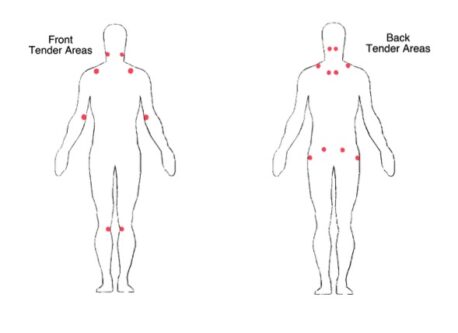Fibromyalgia is a chronic condition that causes widespread pain. It is a condition whereby the threshold of pain is reduced and pain can be caused by non-painful stimuli. It can be associated with poor sleep, poor concentration and extreme fatigue.
Fibromyalgia can occur alongside other conditions that cause muscular and joint pain such as rheumatoid arthritis. It commonly affects those between the ages of 25 and 50 and is more common in females.
The exact cause of fibromyalgia still remains unclear, however evidence shows that the way the nervous system processes pain has been altered and functions differently. This results in increased sensitivity to pain resulting in increased pain felt from painful stimuli (hyperalgesia) and pain felt from non-painful stimuli (allodynia). Pain is also causes an emotional response, suggesting links to the areas in the brain that process feelings and mood.
There is evidence of a link between developing fibromyalgia after a injury, whether that is physical or stress related. There are some studies looking into whether genetics can make you more likely to develop fibromyalgia.
Pain

Fatigue
Poor Sleep
Poor concentration
Aching and stiffness after exercise
Low mood and anxiety is common
Bowel problems
Painful menstruation
Symptoms can be varying with flare-ups making your symptoms suddenly worse for a period of time.
There are no specific tests to diagnose fibromyalgia. Doctors use examinations and blood tests to rule out other causes of symptoms such as inflammatory joint disease and infections.
There are classification criteria that help doctors diagnose the condition. These include the American College of Rheumatology’s classification criteria.
Typically the symptoms of widespread pain should be present for more than 3 months with tender points in a certain number of specific places, associated with poor sleep, fatigue and poor memory.
As the condition varies in severity between people, it is difficult to know how much impact it will have on everyday life. There is no cure to fibromyalgia; treatments are based on improving your quality of life.
Physiotherpists can help with exercise programs and relaxation to relieve the pain.
Occupational therapists can help with ways to work around your condition; including fatigue management, equipment and aids can help you perform your usual tasks.
Psychological therapy is very useful as pain and fatigue can affect your mood. Managing the emotional effect of your pain can help you find coping strategies to improve your symptoms. This can often be in the form of CBT (cognitive behavioural therapy).
Pain clinics can offer support by bringing together specialist team members
Medications are not used first line, but can be used as support with the main focus on coping strategies. Most commonly small doses of amitriptyline are used at night to help with sleep, fatigue and pain.
Versus Arthritis: http://www.versusarthritis.org
Mood café: http://www.moodcafe.co.uk